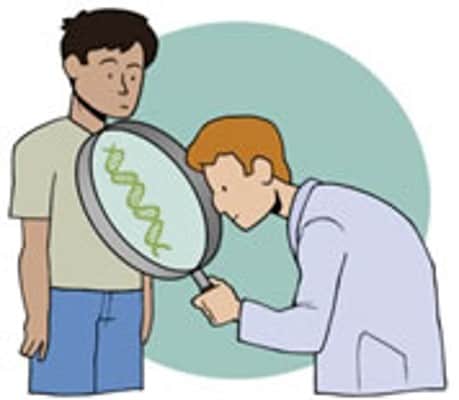
Personalized
Targeted
Nutrition exactly
for you!
Since the compilation of the Human Genome Project at the turn of the century and with the successful mapping of all 25,000 human genes, there has been an explosion of interest in knowing what secrets our genes can tell about our health disease risks.
Not only is the interest exploding in the general population but so has the research into our understanding of the role of gene-diet interactions, gene-environment interactions and even the relationship between our genes and our thoughts and beliefs. These are the bridges into epigenetics, those factors that can dramatically influence our genes.
You see, you may be stuck with a crooked nose or a physical height that makes you a bit vertically challenged, but you are not destined to have diabetes, heart disease, or Alzheimer’s disease because of what your forebearers had to live with. The science of epigenetics teaches us how we can better understand and in many ways override our genetics weaknesses. In other words, we can’t change our genes but we can change the expression of our genes. Or let me put it another way: Genes are your tendency but not necessarily your destiny. It is the epigenetic factors that we can change that will determine whether a gene that is predisposing us to a particular disease gets expressed or not.
It was the completion of the human genome that in many ways fully sounded the death knell of the belief that many of our diseases were genetic in nature and fully awakened us to the understanding that our environment and our food choices can and do alter our genetic expression – sometimes positively and sometimes negatively.
Genes are made up of DNA and the genes have only one job, to make proteins, and each gene makes one specific protein. The most common form of any gene with the normal expression of the gene is called the wild type. Gene expression occurs when gene activity leads to the production of the specific protein.
When a tiny human is being “knit together” in his/her mother’s womb, a change may take place in the normal (wild type) amino acid sequence that makes up the protein the gene is coding for. This is called a variant and it may be only a single amino acid that takes the place of another amino acid found in the wild type.
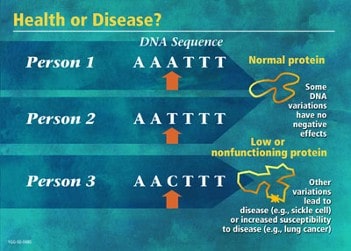
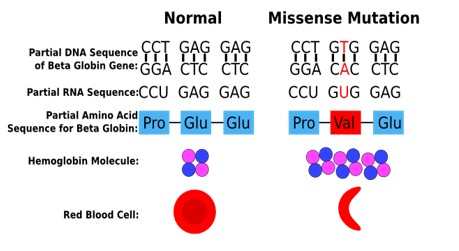
These small variations are frequently referred to as SNPs (“Snips”) and it is an abbreviation for “Single Nucleotide Polymorphisms”. I prefer the term variant (but the word mutation is also used) and it is these variants that make us individually unique and quite different from everyone else. The human DNA consists of over 3 billion nucleotide base pairs, more than 99% of which are identical in every one of us.
| The nucleotide base pairs, thymine-adenine and cytosine-guanine will attach with hydrogen bonds like a zipper. With the influence of sugar-phosphate, they cause the zipper to curl or spiral into the double helix shape of DNA |  |
The fraction that is not is due to these variants. These variants are not necessarily bad, they are just different and every one of us has our unique set of variations from the wild type. It is, however, something on the order of 1/10 of 1% difference in our genetic makeup that gives variation in personality, hair color, different disease tendencies, emotional constitution and so much more that provides for all the different features we see in each other. This genetic variation can also have a very big impact on one’s nutritional requirements and tendency toward disease. The relationship of foods to our genetic makeup is the subject of Nutrigenomics and research in this area is exploding.
Genetic testing assesses the presence or absence of these genetic variations. This is extremely helpful as these variants or SNPs can have a profound effect on the functioning of the genes in which they are found. This in turn affects the biological pathway in which the gene is active, affecting metabolic functions that are important for maintaining a state of good health. Knowledge of these variants offers a powerful health advantage, enabling me to prescribe lifestyle, nutritional and health information that is exquisitely more precise for each patient. The precision is due to the fact that with an understanding of your unique genetic variation I am able to provide specific recommendations that compensate for them, preventing them from becoming a health liability.
The Practicality of Genetic Testing
Let’s look at an example of how this works. 20% of the population has the APOE4 gene. This is the gene that will impact your heart disease risk, memory loss, and is one of the main genes related to Alzheimer’s disease risk. There are APOE2, 3, and 4 alleles of this gene. Having APOE2 or 3 does not guarantee you will not get Alzheimer’s any more than having the APOE4 guarantees you will. But someone with the APOE4 gene must be much more careful with avoiding those dietary and environmental factors that promote the effects of that gene. Remember genes don’t determine our health destiny, our epigenetics does.
You see, having 1 copy of the APOE4 gene (we get 2 copies of genes – one from each parent) increases one’s risk of Alzheimer’s by 30% or more, and with 2 copies the risk increases to at least 50% – 70%. So with that inherited variant one would need to be far more careful in avoiding detrimental environmental factors, eating healthfully, and supporting their body with proper supplements.
Individuals with this APOE4 gene really need healthful fish and fish oil but ironically they have limited uptake of fish oil fats from the blood into the brain. So they need to take as much as twice the amount of these oils and fish that someone without the APOE4 variant would need. And while some may get by with less exercise, those with the APOE4 variant will benefit from a regular exercise program.
In the same way, blood sugar dysregulation is devastating to those with this APOE4 variant. But with proper nutrition, it does not have to lead to this dreaded disease. All this is true preventive medicine and the earlier one starts the greater the benefit. It is for this reason that many encourage parents to have their children tested.
Many individuals searching for a greater understanding of their genetic profile have turned to 23andMe and have been rather disappointed at the avalanche of numbers and genes that provide no understanding as to their meaning, let alone what to do about them.
Taking an At-Home Test
With my at-home test, I discovered that I had a small amount of Neanderthal in my genetic ancestry (and yes my children were not surprised), that I was more likely to have blue or green eyes, and that I was not likely to be lactose intolerant. That and some other tidbits of information are interesting but not very helpful in knowing the strategies I need to ensure a healthy life. But an even bigger issue was found in a limited study completed by Ambry Genetics, a small medical lab in California, researchers discovered using at-home DNA tests to assess for risk of certain diseases or other non-phenotypic traits, such as eye color, resulted in a 40 percent false positive reading. (GENETICS in MEDICINE doi:10.1038/gim.2018.38)
What Ambry Genetics found was consumer labs test genotype DNA rather than sequencing it, and use just one method. Although this method is cheaper and quicker than clinical sequencing, it also is less effective and accurate than the clinical laboratory method of sequencing and using another test to confirm a positive variant. There does not seem to be any question about this as the leading at-home provider of genetic testing said this: “This data has undergone a general quality review; however, only a subset of markers have been individually validated for accuracy.” Source: Gizmodo, Another Reminder That Consumer DNA Tests Are Not 100% Accurate
Here is another huge issue as far as I’m concerned – your raw data is not just in your hands but likely in many other hands as well. The direct-to-consumer DNA testing companies make it clear in their terms and conditions how they use your DNA, and these firms are not bound by HIPAA regulations, which means your personal information is unregulated. And, as with all data, the more places it can be found, the more chances it can be leaked. In fact, one company admitted in 2013 the real goal of the company was not to make money selling DNA testing, but instead to collect massive amounts of data they can use without any further consent. Source: Scientific American, November 27, 2013
I encourage my patients to take the genetic test by Your Genomic Resource that uses a lab associated with Rutgers University – a far more functional, useful, practical, and safe but also highly accurate test. One can actually learn something from it. With it, you get results that are meaningful, with practical information that you can immediately put into practice. You are given specific actionable steps that allow you to correct any dysfunctional genes that can lead to disease progression. And you are likely to discover very specific reasons why you may be having the problems you are dealing with in your life. This is true Functional Genetics
This rapidly growing field of Functional Genomics provides insight as to how your DNA impacts function in your body and how genetic variants may serve as roadblocks to optimal wellness.
For example, glutathione, considered the master antioxidant, protects you from the onslaught of environmental toxicity and from toxins that are naturally created inside the body. But what if your genes do not quite code for the proper production of glutathione. All is not lost as you can intervene, but you need to know if it is necessary to do that. For some, it is critical if they want to have good health.
The test results from Your Genomic Resource is entered into a unique computer program that makes the data from your genes come alive and provides you a rich resource of information that will guide you to a better and healthier quality of life, enable you to look and feel younger even as you age.
Using the analysis from the software, I am now equipped to address your genetic imbalances and formulate a personalized nutritional protocol – personalized specifically for you. It means no guessing about what your body actually wants and needs to function properly. You become proactive rather than reactive as it relates to your health.
Here is how your DNA may directly impact your health
Functional Genomics analyzes hundreds of processes in your genetic patterns. The list below is a small sample of how your DNA may be impacting your health.
• Variants in the HLA and KIAA genes may increase the chances of gluten intolerance. The ABP1 genes that have variants may impact your ability to digest fermented foods, increase histamine levels and result in intestinal inflammation and digestive disturbances
• People with variated SULT SNPs may be more sensitive to toxins, hormones, xenobiotics, and toxic metals
• People with variated PEMT SNPs may be less able to digest and utilize fats
• Those with variated Nrf2 SNPs may be less able to make, utilize and recycle their antioxidants, critical to reducing inflammation and toxicity. No worries, however. There are specific nutrients you can take to correct this genetic disturbance. And you would want to, as Nrf2 is one of our longevity genes.
• Individuals with mutations on their HFE and SLC40A1 genes may have serious unresolved inflammation from iron being a damaging free radical, rather than an essential mineral to support health.
• Genetic impairments to produce nitric oxide can dramatically impact your cardiovascular health, neurotransmitter activity (think mood disorders), and sexual function in both sexes.
There are many more discoveries hidden in your genes that will give you wonderful insight into the steps you can take to improve or to maintain your health. The Functional Genomic Analysis report you will receive will provide you with a mountain of valuable data that commonly reveals the underlying reasons for the many frustrating complaints we experience.
Once you see and hear it explained to you, you will understand why it is so valuable in giving you answers that are literally unavailable with any other medical assessment. But remember to keep in mind that DNA results are never a diagnosis or an absolute determinant of disease. It is those variants in our genes combined with all the epigenetic factors that result in many of our health dysfunctions.
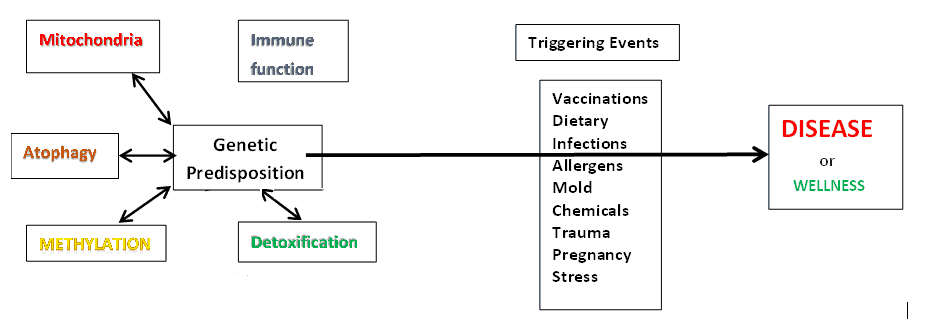
You can see how each of these areas interact with our genes but then notice the many triggering events that act as a primary determinant in causing the expression of our mutated or variant genes. It is the confluence of these factors that is the driving/underlying force behind our ill health and disease progression. But it does not have to remain this way. Notice the effect below as we intervene where our genetics are not favoring us and we correct the triggering factors.
Using Genetic Testing to Improve your Health
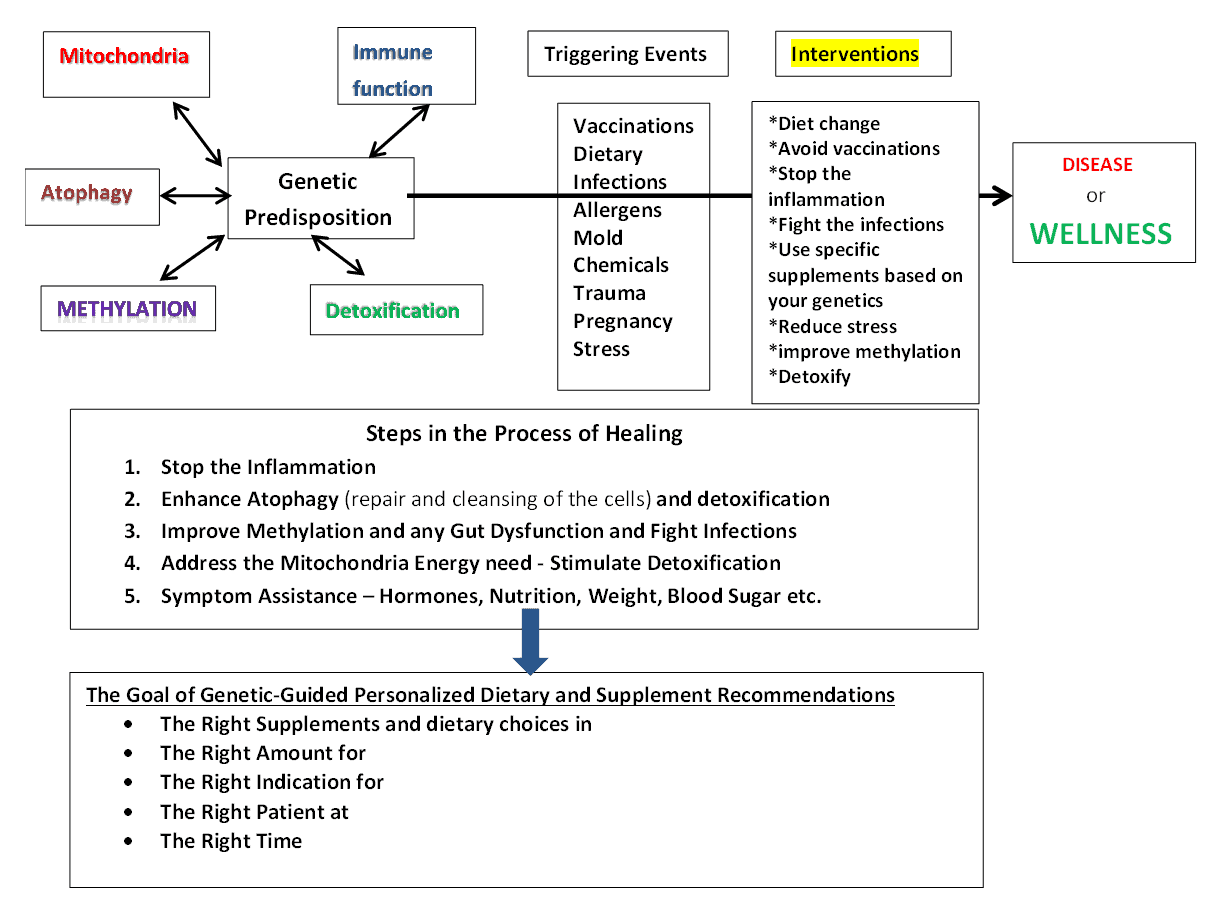
Most all degenerative diseases today are initiated and sustained by inflammation. And that is not surprising when you look at the inflammation genes in those with chronic diseases. It is not unusual at all to find the “ON” genes that turn on inflammation stuck in the “on” position, pushing us toward inflammation. But the worst-case picture is to find the genes that are designed to turn off inflammation “broken” and not functioning.
When we find this unfortunate genetic variation we can use diet adjustments and supplemental nutrients to downregulate the inflammatory genes and in the same way upregulate the genes that turn off inflammation. This is the first and most important step in escaping the chronic disease trap.
It is important to note that none of us have the perfect set of genes. We all have some genes that promote health and some that set us up for impaired health if we are not careful. Many individuals take probiotics but it would be interesting to actually know if there is a great need to be taking them. The FUT2 gene codes for the production of specific sugars that are secreted by our intestinal cells and very much needed for the survivability of our friendly bacteria. Individuals with a genetic variant here fail to adequately produce them and they need to take probiotics on a daily basis.
• If you knew you had a double variant of the VDR gene that might give the reason as to why your vitamin D level is always low. Would that be of interest to you? And if you know that it would also increase your risk of osteoporosis later in life, would you be more aggressive in what you should do to keep that gene from being expressed?
The Human genome contains at least 4 million “switches” that can either turn off a gene or turn it on by dietary and environmental factors (chemical, heavy metals, mold toxins, infections, etc.) and life experiences. These good and bad epigenetic influences, like a virtual “tug of war”, are constantly working for us and our health or against us, putting us at risk for illness of many types. Knowing our genetic variants and the steps needed to reduce their effects, enables the health side of this “tug of war” to have a much greater advantage than the illness side.
So who will benefit from genetic testing? Probably all will to some degree… ok perhaps not if you are already 105 years old and you are still taking daily walks. But otherwise, those who could particularly benefit would be:
• Those who are adopted and have no idea of the health history of their biological family
• Those with gastrointestinal disorders- IBS, IBD, food allergies/sensitivities, hives, reflux,
• Those challenged by stress, anxiety, depression, excessive fatigue, or sleep issues
• Families with members living with ADD/ADHD
• Those having a family history of dementia, Alzheimer’s, or Parkinson’s disease
• Individuals with autoimmune disease or having parents with autoimmunity
• Those with a strong family history of cancer, stroke, heart disease or diabetes
• Individuals sensing a predisposition to obesity
• Women with female problems – fibroids, endometriosis, infertility, PMS
• Sport competitors seeking a competitive edge or budding athletes contemplating competitive sports
• Those living with pain
• Individuals using pharmaceutical drugs who wish to know the better choice of drugs for them
• Parents wanting to give appropriate health guidance to their children.
• Women contemplating pregnancy or hormone therapy or just want to stay healthy
This last category is perhaps the single best time to get this testing done. Testing and making appropriate adjustments based upon the results could make a profound difference in the health of the child lasting their entire lifetime. Epigenetic effects naturally take place in the course of life, but much of it happens in that first month in the womb. It was best stated by William Walsh, Ph.D., Chairman of the Walsh Research Institute:
![]() “The key time to make an impact is before a woman gets pregnant and during the first month – even during the next nine months. This is when these genetic variations get caused – autism and spina bifida and a predisposition for things like mental illness and heart disease. So nutrition is incredibly important. These ‘bookmarks’ are there for the rest of your life.”
“The key time to make an impact is before a woman gets pregnant and during the first month – even during the next nine months. This is when these genetic variations get caused – autism and spina bifida and a predisposition for things like mental illness and heart disease. So nutrition is incredibly important. These ‘bookmarks’ are there for the rest of your life.”
Avoidance of these unhealthy epigenetic effects can only be done if we know which ones are more likely to impact our genetic expression. What you don’t know can affect you. Yes, you are uniquely you and with Your Genomic Resource testing, you can discover your genetic singularity – those factors that you can enjoy as well as those factors that you must not ignore but take charge of, to ensure a long and healthy life. It’s true that we can’t change our genes but we can change the expression of our genes. Remember, our genes tell us our tendency, not necessarily our destiny. With only a small amount of saliva to get it done, you have some amazing and very important discoveries awaiting you.
About Your Genomic Resource Test
• This is not a medical test and is therefore not covered by insurance
• This test does not cover your entire genome of 4 million genes and your ancestry, but it is large – looking into 200,000 potential SNPs for thousands of genes
• This test does not provide a diagnosis or tell you what health conditions you have. But it does give you a window into the underlying reasons for your health conditions
• The report you receive will provide you with guidance for supporting the underlying biochemistry and proper function if a predisposition to weakness is being expressed
• Your personal report will reveal the genes involved with antioxidant production, the potential production of oxidative stress, excess free radicals, possible food sensitivities, potential trouble with histamine, and much, much more.
• Based on the analysis of your test, I may recommend other tests or lab work, lifestyle, or dietary changes as well as suggestions for targeted specific nutrients to support functional weakness.
• Your personal data will never be sold, shared, or given away to anyone. At the testing lab, only your barcode is used and is not tied to your name.
